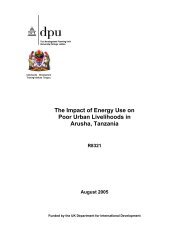EPA Review Annex Documents - DFID
EPA Review Annex Documents - DFID
EPA Review Annex Documents - DFID
Create successful ePaper yourself
Turn your PDF publications into a flip-book with our unique Google optimized e-Paper software.
In this exercise, it is important to ensure that the services and investment chapters provide<br />
for development co operation benefits that adequately support the implementation of any<br />
commitments made. It is also essential that African and Pacific <strong>EPA</strong> partners get the timing<br />
and sequencing of their liberalisation right. Given the limited negotiation and implementation<br />
capacity of these countries, another priority area should be the negotiation of regulatory<br />
frameworks (either on a sectoral or general basis) and the provision of required development<br />
co-operation assistance to ensure the fulfilment of commitments in this regard. African<br />
countries have consistently identified weak regulatory capacity as a hindrance to any<br />
progress in services. “A comprehensive <strong>EPA</strong> may thus represent a useful opportunity to<br />
push ahead in this specific area as the combination of binding commitments on the part of<br />
the African countries coupled with the provision of development assistance and financing<br />
from the EC hold the potential to stimulate economic diversification into services” as Sauve<br />
and Ward, 2009 note. A useful guide here could be the Agreement on Trade, Development<br />
and Cooperation between the EU and South Africa, which has detailed provisions on<br />
development cooperation.<br />
Given that some countries may be better prepared to undertake commitments on services<br />
liberalisation than others, variable geometry should be applied within a region as well to<br />
address the specificities of individual countries and sub-regions. It is also important that any<br />
commitments undertaken by individual countries in the context of an <strong>EPA</strong> remain coherent<br />
with their regional agenda and ambitions, to prevent regulatory fragmentation and<br />
disintegration.<br />
Besides regional considerations, two other key factors are likely to determine the occurrence<br />
and shape of final <strong>EPA</strong>s. The first is the availability of additional aid related to an <strong>EPA</strong>, “or at<br />
least the packaging of existing development cooperation commitments to give the<br />
impression that fresh Aid for Trade is forthcoming” (Bilal, 2009). Many African countries have<br />
expressed their support for an <strong>EPA</strong> subject to the delivery of appropriate development<br />
assistance. New Aid for Trade programmes providing the opportunity for better needs<br />
assessments, a more strategic orientation of the support provided and greater coherence<br />
among donors may result in pro-development outcomes.<br />
The second factor is political. Trade negotiations anywhere are driven by politics as much as<br />
economics and this is no less true of the <strong>EPA</strong> process. Decisions are not always made on<br />
the technical merits of the provisions negotiated, but on broader political and geostrategic<br />
considerations. This is unlikely to drastically change in the near future and would have a<br />
huge bearing on the final shape and outcome of the negotiations and national decisions to<br />
conclude an <strong>EPA</strong> or not.<br />
5. Conclusions<br />
Services are crucial for the development of ACP economies and the <strong>EPA</strong>s provide an<br />
excellent opportunity for catalyzing the growth of this sector. While there has been an effort<br />
to include services in the <strong>EPA</strong> negotiations, with the exception of the CARIFORUM-EU<br />
agreement, the actual outcome falls way short on the triple criteria of coverage, relevance<br />
and feasibility in all other cases. One of the huge problems saddling services negotiations<br />
has been the inherent diversity of these regional groupings and of countries within each<br />
group, which has translated into differences in negotiating objectives and in approaches or<br />
concerns about the <strong>EPA</strong>s and the regional integration processes itself. In addition, political<br />
dynamics and the lack of institutional capacity have also meant that a positive development<br />
outcome has been hard to achieve.<br />
An ideal agreement between the EU and ACP countries should build on existing provisions<br />
on services in the CARIFORUM-EC agreement through a focus on specific services sectors<br />
in these economies such as tourism, air transport (passenger as well as cargo), distribution<br />
194
















